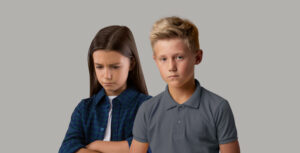As a family therapist and life coach, I understand the concerns parents have when it comes to their child’s behavior, especially when aggression becomes a topic of discussion. In this article, we will delve into the characteristics of child behavior psychology related to aggression. By gaining a deeper understanding of these traits, you will be better equipped to identify and address aggression in your child.
- What is aggression in children? Aggression is a complex behavior that can manifest differently in each child. It involves the intentional act of causing harm, whether physical or verbal, towards oneself, others, or objects. Understanding the underlying causes and characteristics of aggression can help parents respond effectively and provide the necessary support.
- Nature vs. nurture: Are children born aggressive? While some children may have a predisposition towards aggression due to genetic factors, it’s important to note that aggression is influenced by a combination of both nature and nurture. Environmental factors, such as family dynamics, parenting style, exposure to violence, and socioeconomic status, can significantly impact a child’s aggression levels.
- Recognizing signs of aggression: As parents, it’s crucial to be vigilant and recognize potential signs of aggression in your child. These may include: a) Frequent physical fights or acts of violence b) Verbal aggression, such as threats or insults c) Defiance towards authority figures d) Frequent outbursts of anger or frustration e) Destructive behavior towards property f) Bullying or displaying aggressive behavior towards peers
- Understanding the causes: Aggression in children can stem from various causes, including: a) Frustration and anger: Inability to manage strong emotions can lead to aggressive behavior. b) Lack of social skills: Poor communication and problem-solving abilities can contribute to aggressive interactions. c) Modeling behavior: Children often imitate aggressive behavior they witness in their environment. d) Emotional or psychological issues: Underlying mental health conditions can manifest as aggression in children.
- Open communication: Encourage your child to express their emotions and feelings in a healthy way.
- Teach empathy: Help your child understand the impact of their actions on others.
- Set clear boundaries: Consistent discipline and consequences for aggressive behavior are crucial.
- Model appropriate behavior: Be a positive role model by demonstrating patience, problem-solving, and conflict resolution.
- Seek professional help: If your child’s aggression persists or is causing significant distress, consulting a clinical psychologist can be beneficial.
Remember, these examples should be adapted to suit the age and development of your child. It’s essential to approach each situation with patience, understanding, and consistency to effectively address aggression and promote positive behavior in children.
Understanding the psychology of aggression in children is an important step towards effective parenting and providing the necessary support for your child. By recognizing the characteristics and underlying causes, you can respond appropriately and implement strategies to address aggression. Remember, every child is unique, and seeking professional guidance when needed can make a significant difference.
To further enhance your parenting skills and gain comprehensive insights into addressing childhood aggression, we invite you to explore our self-directed Parents Video Course available on our website. This course offers practical techniques, real-life scenarios, and expert guidance to equip you with the tools you need to create a safe and nurturing environment for your child’s growth and well-being.
If you need help dealing with your angry, aggressive child, and ensuring the safety of yourself and others in your home, we are here for you. We encourage you to go through our program to learn more about what you can do to help your child, yourself and the other members of your family. You can also contact us to schedule a private, one-on-one video or phone session with an experienced BTC coach or counselor. Never forget: you, as the parent, have the power to guide your family to a better way of living.









